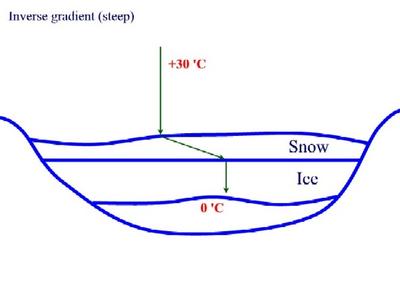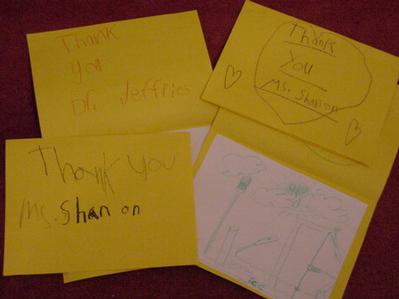9 April, 2002
Weather: Cloudy
High 27
Low 4
Working on Sigma Plot and Igor pro, two data entry and graphing
software used for Dr. Jeffriesí lake ice study, I noticed the gradual
decrease in heat flux. The changes of variables (snow temperatures,
depth, and densities) impact this gradual decrease. After returning
from lunch, Martin and I received a nice surprise from deaf students
who went on a field trip to Aurora pond on April 4th. See below
thank you cards and drawings.
Heat Flow Calculations
If you've completed a physical from an Ice
doctor, proceed with heat flow calculations with the following data
below:
April 5th
Mean temperature gradient
-7.66490
C/m
Thermal conductivity
0.05977 W/m/K
April 6th
Mean temperature gradient
-7.01233
C/m
Thermal conductivity
0.06001 W/m/K
April 8th
Mean temperature gradient
-10.3696 C/m
Thermal conductivity
0.06018 W/m/K
The Science Behind Inverted Heat Flux
If we multiply a negative temperature gradient with thermal
conductivity, we will have a negative heat flux (an upward flow). On
the other hand, a positive temperature gradient will result a
positive heat flux (downward heat flow). This will happen more often
at this time of year with increasing air temperatures. See below a
diagram illustrating inverted heat flow.
So, What Do You Think?
We will be working at Poker Flat again tomorrow. Predict heat flow
results from Jalpertia pond. Refer to April 10th journal entry for
results.

1. Inverted Heat Flux and Positive Temperature Gradient: (Evidently, ice will not be present at +30 'C but to give you an idea - warmer air temperatures will invert the heat flow.)

2. Last week, a group of deaf students went to Aurora pond for some snow and ice hands on activities - here are some excellent drawings and thank you cards from them. Thanks!!
Contact the TEA in the field at
.
If you cannot connect through your browser, copy the
TEA's e-mail address in the "To:" line of
your favorite e-mail package.
|
